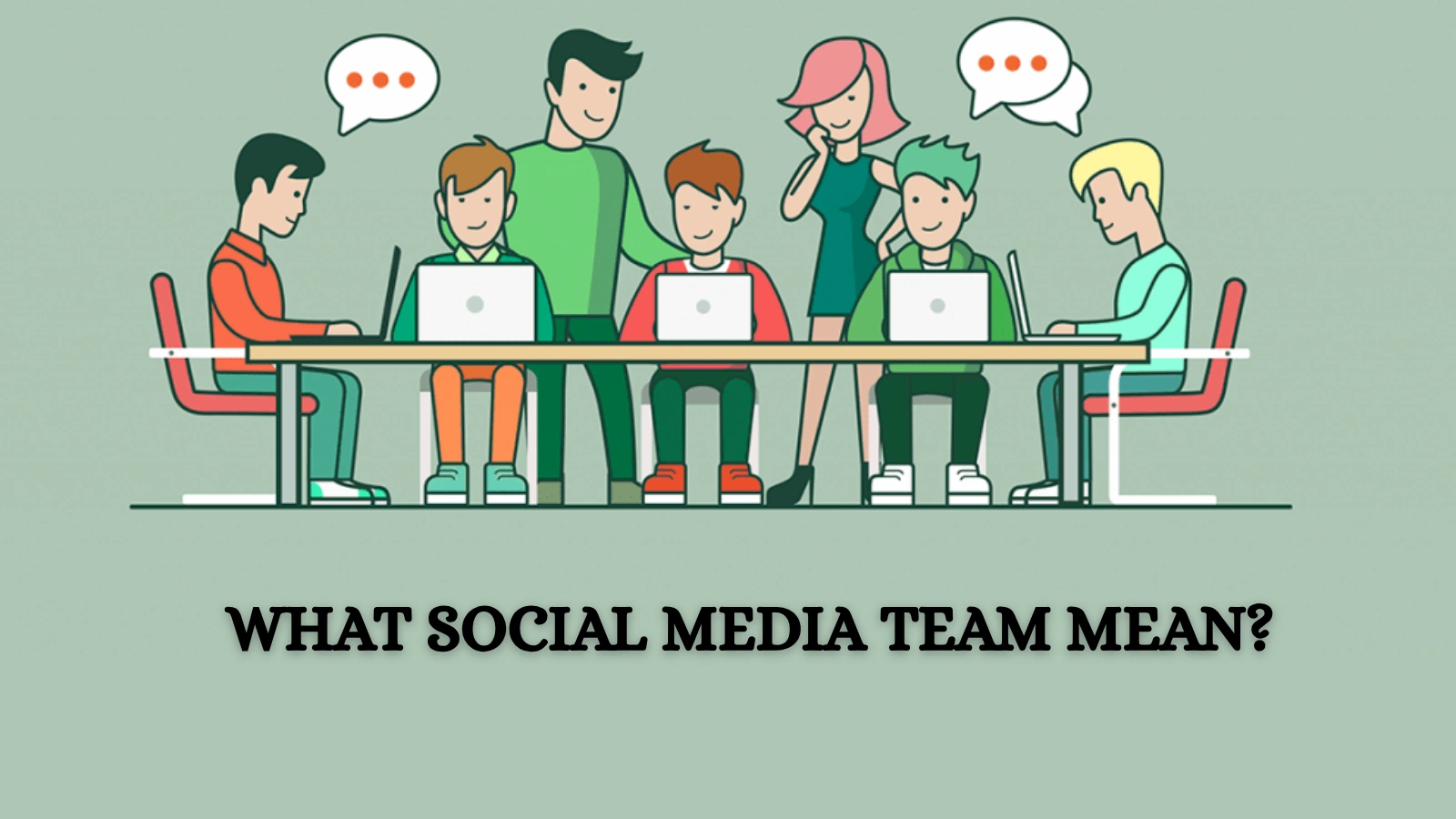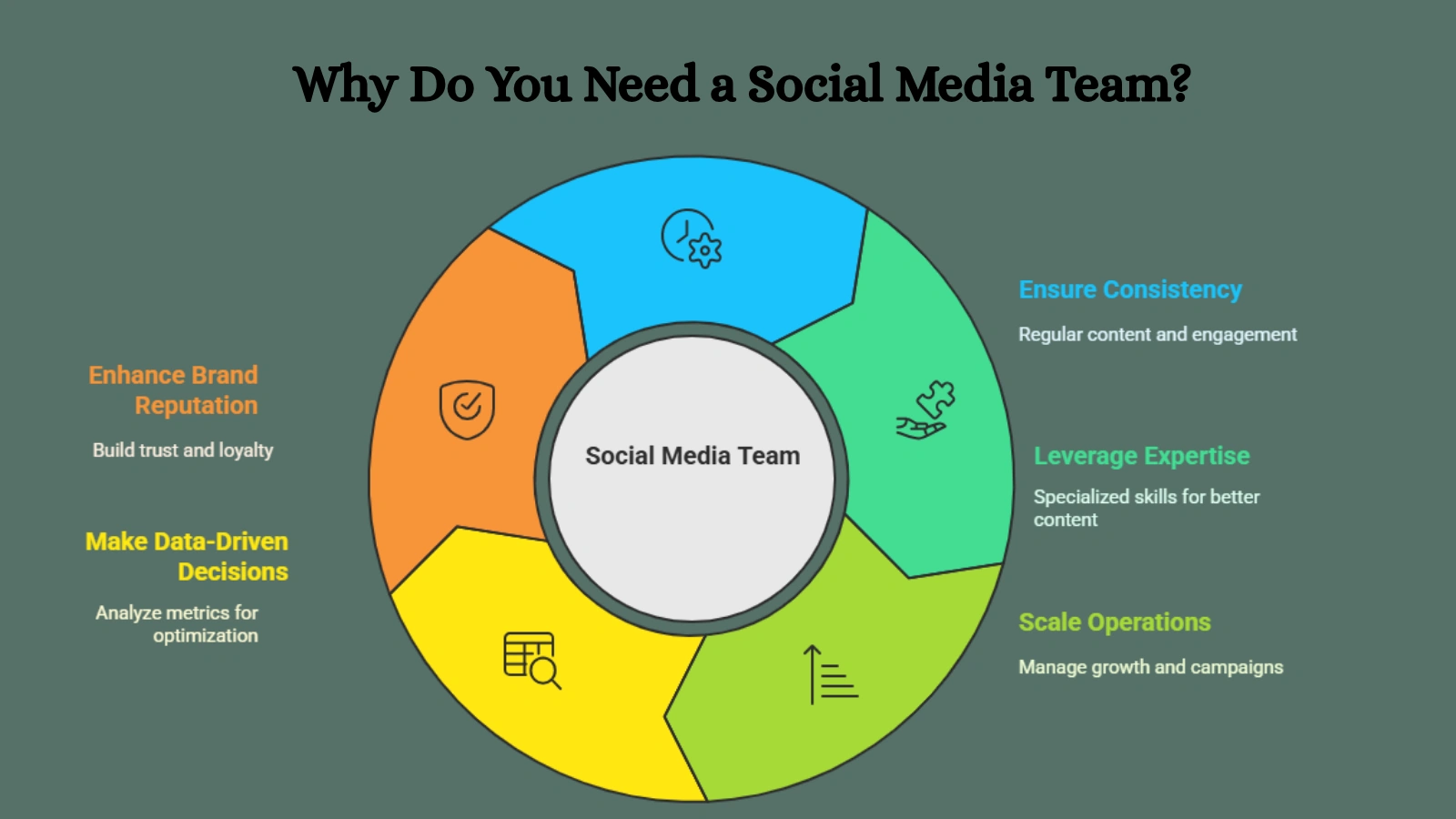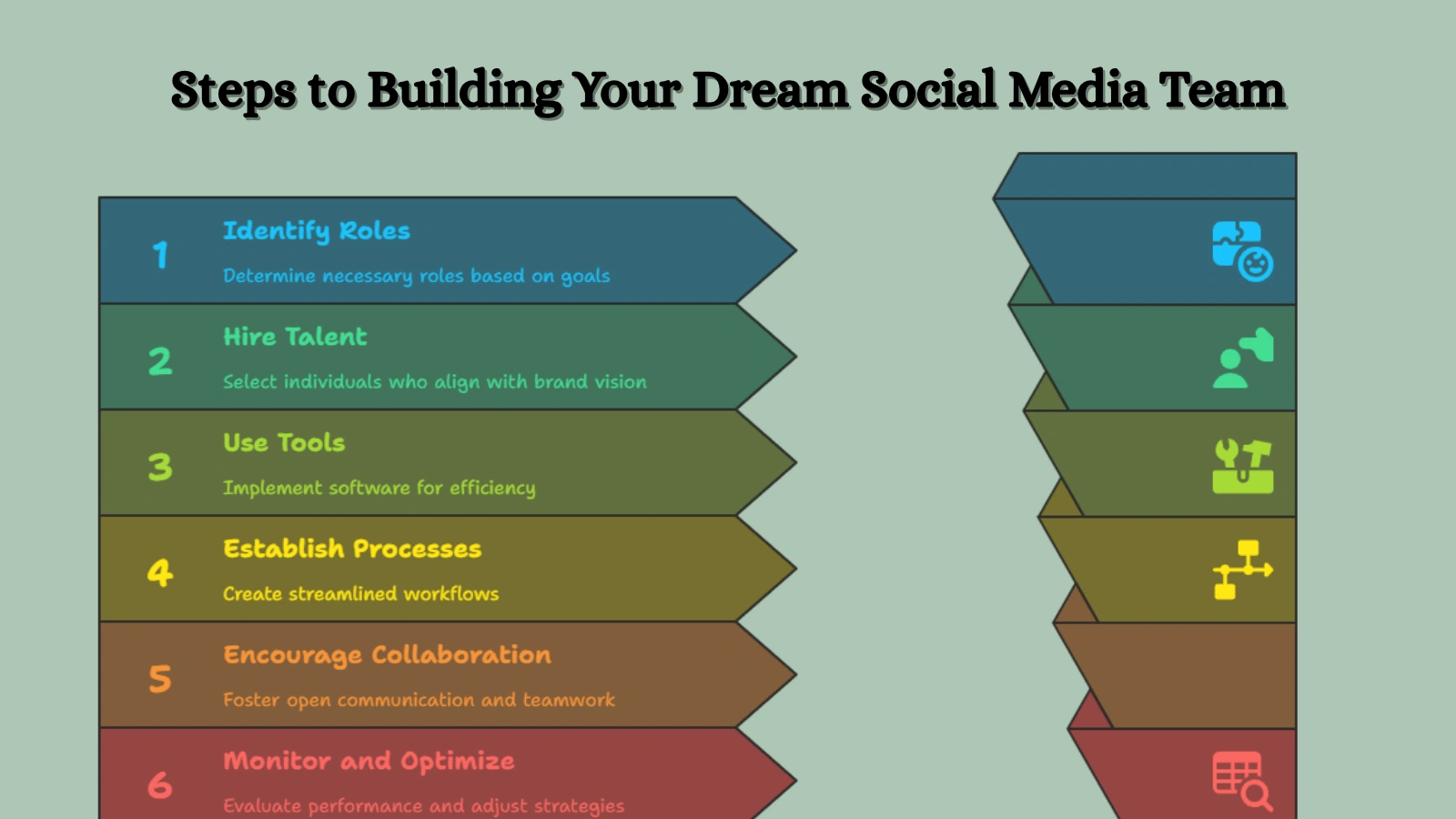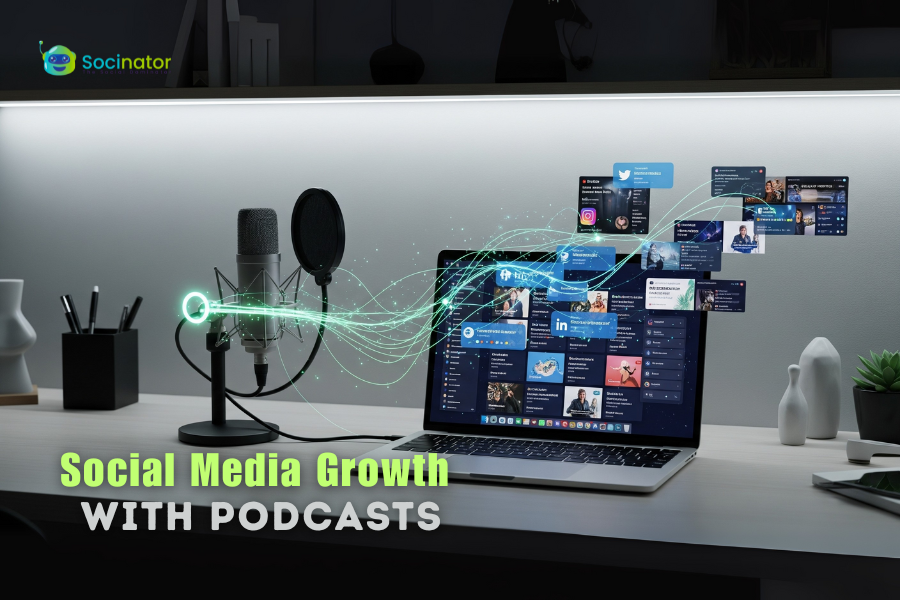“In the age of constant connectivity, a compelling social media teams presence is essential for any brand aiming to stay relevant and competitive.”
Brands live and grow online, where social platforms drive awareness, shape public perception, and spark real conversations with customers. At the heart of all this? A skilled, strategic, and collaborative social media team.
Whether you’re a lean startup aiming to build visibility or an established enterprise looking to scale your reach, the quality of your social media teams can make or break your digital success. Gone are the days when a single person could manage it all. Today’s landscape demands a team that blends creativity, strategy, analytics, and technology.
In this blog, we’ll break down everything you need to know about building a winning social media team, from defining clear roles to selecting the right tools and optimizing collaboration. Whether you’re just starting or refining your structure, this guide will equip you to create a high-performing team that fuels growth, engagement, and long-term brand loyalty.
In a hurry? Listen to the blog instead!
What Does a Social Media Team Mean? 
A social media team is a group of professionals who work together to build and manage a brand’s presence on platforms like Instagram, Facebook, LinkedIn, and X (formerly Twitter). Their goal is to connect with the target audience, create meaningful social media content, and drive engagement that supports business objectives.
This team typically includes roles such as content creators, strategists, community managers, and analysts. Each member contributes different skills, some focus on visuals and copywriting, others on analytics or audience engagement. Together, they help shape a consistent and effective online presence.
Rather than just posting occasionally, a true social media team works strategically. They plan content calendars, track performance, and adjust strategies based on real-time feedback and results. Their work is guided by the brand’s voice, values, and marketing goals.
Team size can vary; some businesses have two or three people managing everything, while larger organizations may have full departments. Regardless of size, the main purpose is to build trust and connection with followers while supporting business growth.
In short, a social media team plays a critical role in digital marketing by making sure a brand stays relevant, visible, and engaged with its community.
Read More!
How To Create A Social Media Content Plan? (9+Tips And Tricks)
What Does A Social Media Team Do?
Social media teams are responsible for far more than just posting updates. They are the architects of your online brand presence and play a crucial role in shaping how your audience sees and interacts with your business.
Here are the key responsibilities of a modern social media team:
- Developing a social media strategy that aligns with your brand’s goals and voice.
- Creating engaging content, including videos, images, graphics, and written posts that resonate with your audience.
- Scheduling and publishing posts consistently across platforms.
- Monitoring brand mentions and staying updated on trends and conversations in your niche.
- Responding to followers, handling comments, DMs, and feedback in a timely, professional manner.
- Managing social media advertising, including setting up campaigns, managing budgets, and analyzing ad performance.
- Tracking performance data and generating reports to evaluate the impact of campaigns.
- Making data-driven improvements based on analytics and user engagement.
In essence, a social media team ensures your brand is always active, responsive, and aligned with audience expectations. A strong team turns your social media presence into a powerful marketing engine that builds trust, fosters community, and drives results.
Why Do You Need A Social Media Team?
Many brands begin their social media journey with just one person juggling all tasks from content creation to replying to comments. While this can work at the start, it quickly becomes overwhelming as the brand grows.
Here’s why building a dedicated social media teams is crucial:
1. Consistency
Consistency is the key to visibility and trust on social media. When only one person is responsible, posting can become irregular, especially when other priorities arise. A team ensures that content is consistently created, scheduled, and published. It also guarantees that responses to followers are timely, keeping your brand actively engaged and top-of-mind.
2. Expertise in Different Areas
Social media success demands a mix of skills copywriting, video editing, community engagement, analytics, and advertising. It’s rare for one person to master all of these. A diverse social media marketing team brings in specialists, each focused on their area of expertise. This leads to better content, more strategic decisions, and higher-quality engagement.
3. Scalability
As your business grows, so will your audience, platforms, and content needs. Managing everything manually becomes unrealistic. A social media management team makes scaling your presence smoother, handling multiple accounts, increasing post frequency, and managing larger campaigns without dropping the ball.
4. Data-Driven Decisions
Success on social media isn’t just about being creative; it’s about being analytical. With a dedicated analyst or strategist on your team, you can interpret performance metrics, identify trends, and continuously optimize your strategy for better results. This ensures your efforts align with real user behavior and business goals.
5. Better Brand Reputation
Having a responsive, thoughtful team behind your social media helps your brand build stronger relationships. Prompt replies, professional handling of feedback, and engaging conversations foster trust. A well-organized social media team ensures your brand looks polished and credible, which boosts reputation and customer loyalty.
Social Media Team Structure
The ideal social media team structure depends on your company’s size and goals. A clear structure helps divide responsibilities and ensures nothing is overlooked. Here are some of the most common roles found in successful social media teams:
1. Social Media Manager
The Social Media Manager is the leader and strategic planner of the team. This role involves overseeing the entire social media presence, from planning content calendars to aligning campaigns with overall business goals. They ensure that the brand’s voice is consistent across all platforms and coordinate the efforts of different team members. Additionally, the Social Media Manager monitors performance metrics, adjusts strategies based on insights, and reports results to higher management. Their ability to lead, organize, and strategize is crucial for keeping the team focused and effective.
2. Content Creator
Content Creators are responsible for crafting visually appealing and engaging content that captures the brand’s personality. This includes creating graphics, writing captions, producing photos, designing carousels, and even filming short-form videos. Their work ensures that the brand maintains a strong, recognizable identity across platforms. A good Content Creator understands the target audience, keeps up with trends, and adapts content to suit each platform’s unique format and tone. Their creativity directly influences how the brand is perceived and remembered.
3. Community Manager
The Community Manager serves as the direct link between the brand and its audience. They respond to comments, DMs, and mentions, helping build trust and engagement. This role requires emotional intelligence, empathy, and fast communication skills, as they often handle customer concerns, compliments, and even complaints. Beyond engagement, they monitor conversations around the brand, manage brand sentiment, and help cultivate a loyal online community. A strong Community Manager makes followers feel heard, appreciated, and connected to the brand.
4. Analyst/Strategist
An Analyst or Strategist ensures that the team’s actions are backed by data. They track KPIs such as reach, engagement, click-through rates, and conversions to assess what’s working and what needs improvement. Their job is to turn complex data into clear insights and recommendations. They also keep an eye on trends, conduct competitor analysis, and guide the team with a data-informed strategy. This role is essential for optimizing campaigns, improving ROI, and ensuring that every post or ad aligns with the team’s performance goals.
5. Paid Ads Specialist
The Paid Ads Specialist focuses on managing advertising campaigns across social platforms like Facebook, Instagram, TikTok, and LinkedIn. Their responsibilities include setting campaign goals, defining audience targeting, managing budgets, and continuously optimizing ads to achieve maximum return on investment. They closely monitor ad performance and adjust creatives, copy, and bidding strategies to improve results. This role requires technical skills, analytical thinking, and a strong understanding of ad platforms to ensure that paid promotions drive meaningful business outcomes.
6. Video/Multimedia Producer
The Video/Multimedia Producer creates dynamic video content that elevates the brand’s visual storytelling. From Instagram Reels and TikTok to longer-form YouTube videos, you can use social media marketing software and do animations; they handle everything from scripting to post-production. Their goal is to produce content that not only entertains but also educates or inspires the audience. With video being one of the most consumed content types today, this role is increasingly important for boosting engagement and reach. A skilled video producer knows how to balance creativity with marketing objectives, creating content that drives both emotion and action.
Each of these roles plays a vital part in building a strong and effective social media team. While larger companies may have dedicated individuals for each position, smaller teams might combine responsibilities. Regardless of the team size, ensuring that all these functions are covered is essential for maintaining a consistent, engaging, and results-driven social media presence.
Steps to Building Your Dream Social Media Teams
Here’s how to build a strong and efficient social media teams step-by-step:
Step 1: Define Your Goals
Start by identifying what your social media marketing team should accomplish. Are you focusing on brand awareness, user engagement, customer support, or lead generation? Clear goals will guide every decision from who to hire to what tools you need.
Step 2: Identify Key Roles
Decide which roles are crucial based on your goals and available resources. Do you need a content creator right away, or is a strategist more important? Use the structure discussed earlier to map out an ideal setup tailored to your business stage.
Step 3: Hire the Right Talent
When building your team, prioritize not just technical skills but cultural fit and brand understanding. Find professionals who align with your vision and can communicate your brand message authentically across platforms.
Step 4: Use the Right Tools
Efficiency is key. Invest in social media marketing software for scheduling, analytics, collaboration, and creative tasks. Tools help your team stay on top of deadlines and deliver high-quality content at scale.
Step 5: Establish Clear Processes
Create a streamlined workflow. Define who does what, how approvals work, and how content calendars are managed. This minimizes confusion and ensures smooth execution.
Step 6: Encourage Collaboration
Promote open communication within your social media teams. Regular brainstorming, feedback sessions, and cross-functional teamwork lead to more creative and consistent campaigns.
Step 7: Monitor and Optimize
Evaluate performance consistently. Track key metrics, gather insights, and adjust strategies based on what’s working (and what’s not). Data-driven tweaks help your team continuously improve and achieve better results.
How To Manage Social Media More Efficiently With Sociantor?
Managing social media teams effectively requires more than just people; it requires the right tools to support collaboration, automation, and performance tracking. That’s where Socinator stands out.
Socinator is a powerful and versatile social media marketing software designed to help your social media management team execute tasks more efficiently. It empowers teams to streamline operations, save time, and achieve better outcomes through automation and real-time insights.
Key Features Built for Social Media Teams
Unified Scheduling Across Platforms
No more juggling tools for different platforms. Your team can schedule and auto-post content to Instagram, Facebook, LinkedIn, Twitter, Pinterest, and more, all from one dashboard. This keeps campaigns consistent and on-brand, even during busy periods or holidays.
Automated Engagement = More Time for Strategy
Socinator automates repetitive actions like liking, commenting, following, and messaging. This means your team can focus on high-level content creation and strategy, while automation drives engagement in the background.
Performance Reports That Drive Smart Decisions
Your analysts or social media managers can track campaign performance using detailed analytics and insights. Socinator helps you see what’s working, optimize targeting, and report results with confidence.
Seamless Team Collaboration
Assign roles, manage tasks, and track progress with built-in collaboration features. Everyone, from content creators to strategists, can work in sync, reducing miscommunication and speeding up approval workflows.
Content Calendar Management
Keep your content plan organized and visible to your entire team. The shared calendar makes it easy to align on deadlines, campaign timelines, and upcoming promotions.
Secure Multi-Account Management
Manage up to 150+ accounts securely. Role-based access ensures team members have the right permissions without compromising brand security, ideal for agencies and large teams managing multiple clients or brands.
In short, Socinator helps your social media teams do more with less. It frees up time for creative work, improves collaboration, and provides the insights needed to make smarter decisions, all in one easy-to-use platform.
Conclusion
Social media teams are the driving force behind a strong digital presence. With the right structure, talent, and tools, your brand can achieve consistent growth and meaningful engagement. Whether you’re building a team from scratch or improving an existing one, start by defining clear goals and investing in the right software. And don’t forget tools like Socinator can take your team’s performance to the next level by saving time and streamlining processes.
Your perfect social media team is not just about hiring; it’s about creating a culture of creativity, collaboration, and continuous improvement. So, start building your winning team today and let your brand shine online!
Read More!
Ultimate Guide: 11 Social Media Management Tool
How To Master Social Media Reporting: A Step-by-Step Guide For 2025
FAQs
1. What is the main role of a social media team?
A social media team manages a brand’s online presence through content creation, community engagement, strategy execution, paid campaigns, and performance analysis. They ensure the brand stays visible, consistent, and connected with its audience.
2. How many people should be on a social media team?
The size depends on your company’s needs. Small businesses may operate with 2–3 people, while larger brands often have 5–10+ specialists covering strategy, content, engagement, paid ads, and analytics.
3. What are the essential tools for social media teams?
Key tools include scheduling software, content creation tools, analytics dashboards, and collaboration platforms. Tools like Socinator offer all-in-one solutions to boost efficiency and performance.
4. Can one person manage social media for a brand?
Yes, but only up to a point. A single person can manage the early stages, but as the brand grows, a team becomes necessary to maintain consistency, handle workload, and drive better results.
5. How does Socinator benefit social media teams?
Socinator automated posting, engagement, and social media reporting. It supports team collaboration and provides scalable, secure solutions to help social media teams work smarter and grow brands faster.






